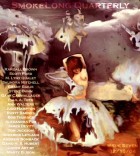Two days ago, my mother died in a small village of the Algerian mountains. I will not speak its name. I watched from a mountain pass above the village as the bombers lumbered in from the West, invisible with the evening sun. Tri-coloured splashes marked their wings. The sun burned across their glassed canopies and I shielded my eyes. They dropped their bombs into the center of the village and shot into the sky with the release of their burden. The village burned.
My mother was peculiar. The village was at first reluctant to support Algeria’s break from France, but she was typically defiant and organized the men into teams who watched the passes that led into the valley. The men came to respect her, but I knew her only as my mother. She sent a young woman out of the mountains to buy more ammunition. Word came weeks later that the French caught her in the act and sent her to a prisoner camp where she was raped and murdered.
Yesterday I walked out of the mountains and onto the featureless plains at their feet. The ground provided no shelter and dust choked me until I found the hard packed road.
I met a man and his dog this morning. He spoke of the death of Albert Camus. The man’s face filled with tears and he choked the words. I did not know what a Nobel Prize was, but my mother spoke of him as a hero and so he must be. The dog was ancient as was the man. They limped along in similar fashion and growled at the interminable heat. The dog teetered on the brink of collapse and I stopped to give it some water from my canteen.
“Don’t do that,” the old man demanded. “He has known only one master, he’s too old to rely on another.” He scowled at the dog and the dog’s lip peeled in a snarl that presented its few, yellowed teeth. “Ungrateful bastard,” the old man’s voice rose to a screech. The dog yelped in pain as the man’s out flung boot caught it in the ribs. The animal rolled in the dust, scrabbled to its feet, then trotted in behind its master’s plodding feet.
At midday, we stopped and sat at the edge of the road. The dog whined and looked longingly at my canteen. I felt empathy for the beast. The man talked about his grandsons who were in a prisoner camp some forty miles from where we sat. He was going there to give them a letter from their mother.
“What of the French,” I asked.
“Fuck the French,” he smiled and showed me a knife he carried in his leggings.
We shared a cake I had in my satchel. He fed the dog from his own hand, but refused the water I offered. The dog ate the dry cake and looked again at my canteen. The sun rose to its full height and my mind slipped to thoughts of my mother and then to the woman I had slept with in the village, before she was sent away. She had died in the same camp as the man’s grandsons.
We walked until late in the evening. There was no wood for a fire and we quickly fell asleep. I woke to the noise of metal striking earth. The sun pushed up from the horizon in a bloody birth of day. The old man stabbed the knife into the ground and sobbed with every stroke. The dog lay at his side. It was mid-morning when he’d finished and tenderly placed the animal into the hole. After covering it, he rose and stiffly slapped the dust from his leggings, then spoke without looking up from the mounded earth.
“Could you write something for him, mark his grave?” He offered the letter he had carried this far.
“What shall I write?” I frowned and took the envelope from his gnarled hands.
“I was his only master,” he whispered.
He turned and walked to the place he had come from, to the far mountains. A morning breeze picked up and I soon lost the man’s form in the growing gray haze.
I wrote the words on the hundred franc note the French officer had given me for information about my mother and the village. I placed the letter in my satchel and continued down the road to a place I did not know.


 The core workshop of SmokeLong Fitness is all in writing, so you can take part from anywhere at anytime. We are excited about creating a supportive, consistent and structured environment for flash writers to work on their craft in a community. We are thrilled and proud to say that our workshop participants have won, placed, or been listed in every major flash competition. Community works.
The core workshop of SmokeLong Fitness is all in writing, so you can take part from anywhere at anytime. We are excited about creating a supportive, consistent and structured environment for flash writers to work on their craft in a community. We are thrilled and proud to say that our workshop participants have won, placed, or been listed in every major flash competition. Community works.